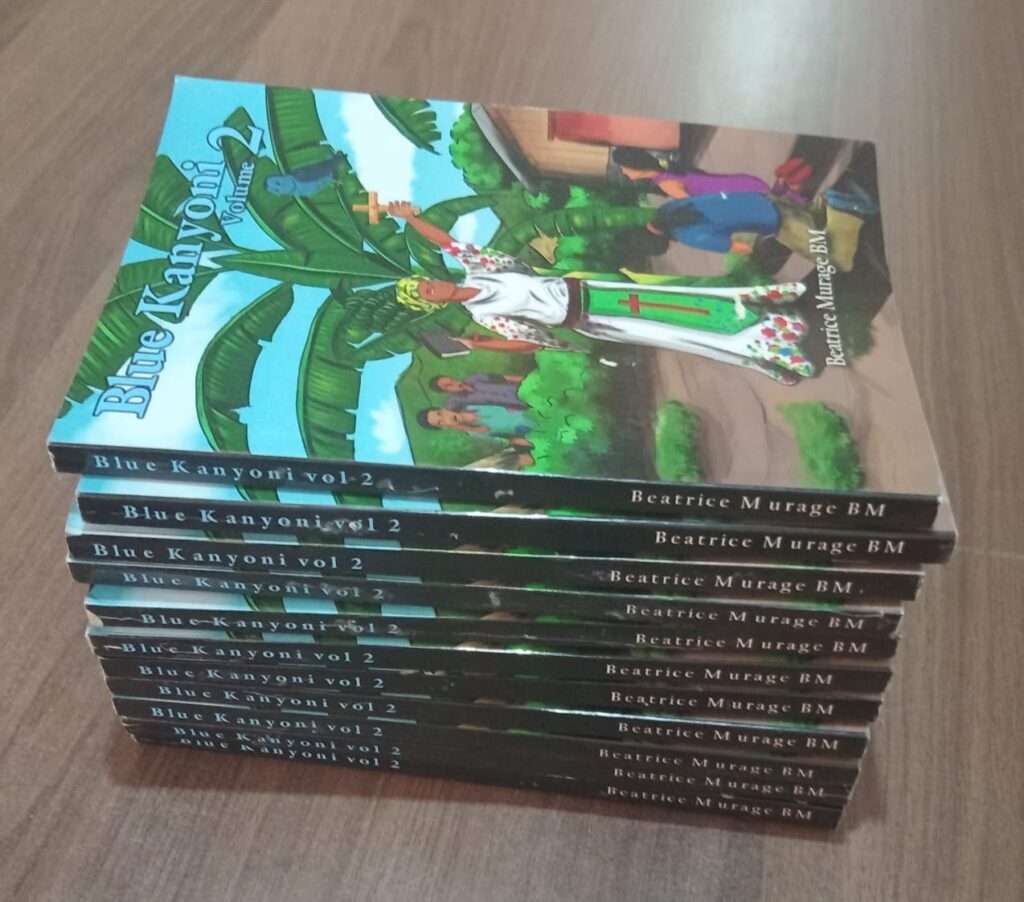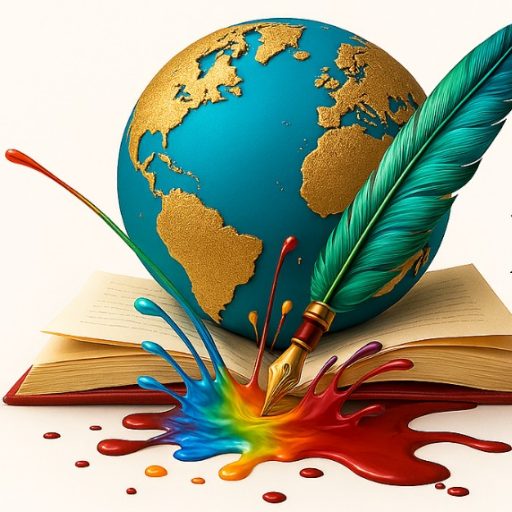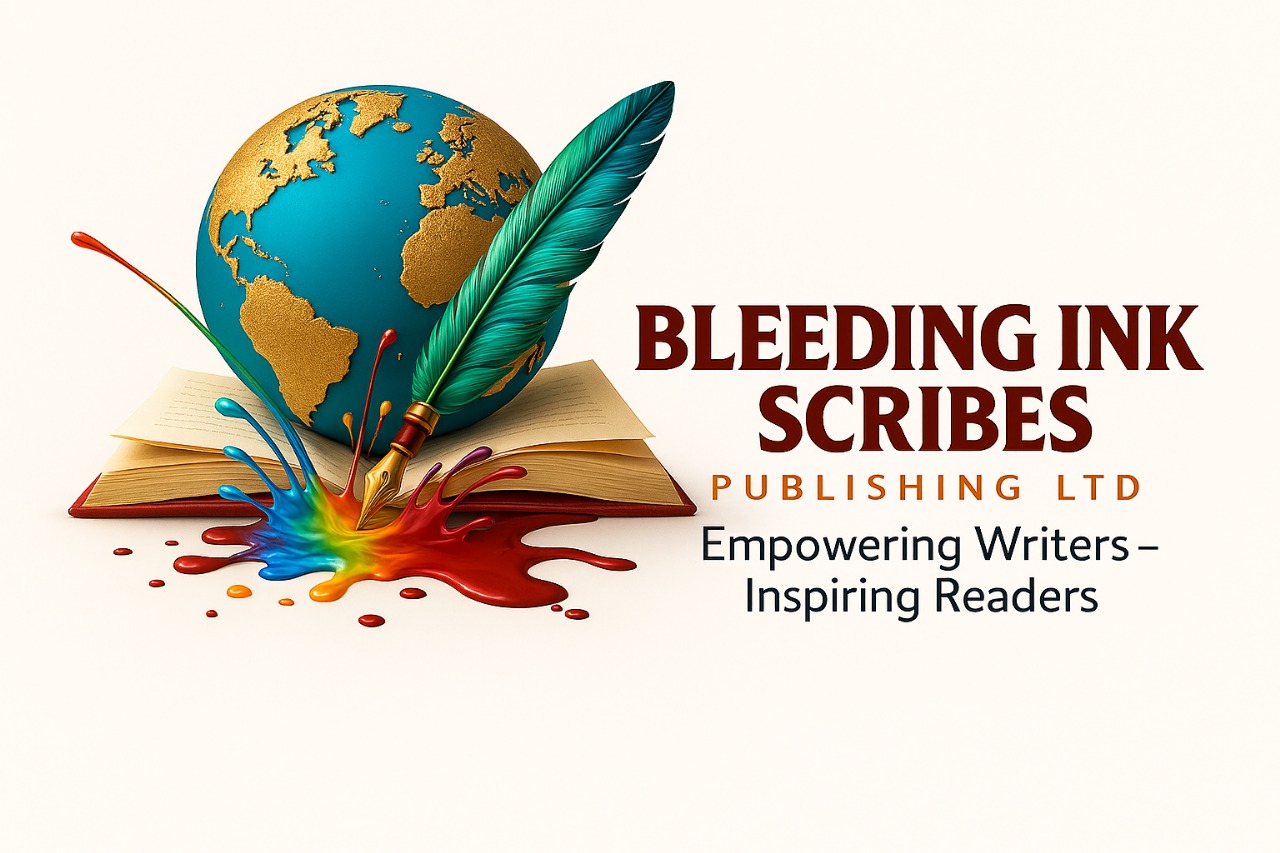Title: Blue Kanyoni Two
Author: Beatrice Murage
Publisher: Bleeding Ink Scribes Publishers
Year: 2025
Reviewer: Bonface Otieno Okinyi
Retail Price: Kshs 900/- At Bleeding Ink Ecommerce Store
In Blue Kanyoni Volume 2, Beatrice Murage deepens the saga of the Mama Kui’s household, focusing on the aftermath of Shantel’s betrayal, the spiritual crisis that follows, and the long road to forgiveness and self-discovery. This volume blends satire, mystery, and spiritual realism with the familiarity of rural social dynamics.

Whereas Volume 1 explored betrayal, Volume 2 delves into redemption and identity. The mysterious theft of Shantel’s corpse, the emergence of Prophetess Waruguru with her bizarre rituals, and Baba Kui’s reckoning with his past all form the intricate web of conflict. The novel asks: Who was Shantel? Was she a con artist, a wounded soul, or a spiritual enigma?
The unresolved grief, deception, and spiritual confusion faced by Mama Kui underscore the enduring trauma caused by betrayal and cultural entanglement. Spiritual manipulation and religious theatrics unfold. Prophetess Waruguru is a satirical portrayal of Kenya’s mushrooming charismatic churches that prey on vulnerable women. This invokes Ngũgĩ wa Thiong’o’s critique in The River Between of the misuse of religion.
Forgiveness and healing generally is the lit torch of hope. Mama Kui’s quiet strength and refusal to succumb to revenge or bitterness become the heart of the narrative. Her emotional intelligence elevates her as a new African matriarch.
Identity and deception have always formed a crisis’ spine in most African societies; it remains so even when literature shoots a lot of attempts to resolve the phenomena. The enigma of Shantel’s “double life” reveals how fragmented identities operate in modern Kenya.
Tradition vs. change has been in limbo for quite some time, technological advancements, globalizations, modernism, and civilization has exposed many people in Africa, that bare fact though has not eliminated the maze between tradition and transition. The generational conflict, religious shifts, and urban-rural divide are further explored, giving voice to a community in flux.
Volume 2 offers more psychological depth. Baba Kui is humbled and becomes a tragic reflection of guilt and failed masculinity. Giving my unsolicited opinion, NGOs, governments, policy makers and other stakeholders for over a decade shifted policy attention towards the empowerment of the girl-child without teaching the masculine community on how to co-exist with an empowered woman. Mama Kui emerges as a philosophical and emotionally mature woman whose silence and actions offer a more powerful resistance than speech. The mysterious Waruguru is both a comedic and symbolic figure—a personification of religious charlatanism.
Wacaro, the village gossip, adds humour and sharpens the satirical edge.
Murage’s narrative continues with rich imagery, folklore tone, oral storytelling rhythm, and strong episodic structure. The pacing is more suspenseful, with cliffhangers and mysteries surrounding Shantel’s body, strange rituals, and Mika’s hidden motives. Waruguru’s dramatic scenes are theatrical and evoke magical realism—blurring lines between reality and spiritual drama.
Compared to Volume 1, Blue Kanyoni 2 is more experimental. It leans closer to Yvonne Adhiambo Owuor’s Dust in its psychological depth and elliptical truths. The use of religious satire echoes Wahome Mutahi’s Three Days on the Cross. Like The River and the Source, it affirms the dignity of the African woman navigating loss, faith, and family duty.
She uses Psychoanalytic theory. Shantel’s unknown past, Baba Kui’s guilt, and Mama Kui’s internal healing invite Freudian and Jungian readings.
Structuralism. The binary oppositions—truth/lies, spirit/body, male/female, tradition/modernity—shape the novel’s moral architecture.
Postmodernism. The novel’s refusal to offer a fixed truth about Shantel’s life and the subversion of religious authority reflects a postmodern worldview.
The novel reflects the growing spiritual desperation among Kenyans seeking miracles amid hardship, the prevalence of deceptive religious figures, and the emotional fallout of unregulated polygamous unions. The drama of land disputes, broken families, and religious theatre reflects daily headlines in Kenya.
In conclusion, this is one of the most powerful sequels I have read recently. Beatrice Murage’s Blue Kanyoni duology is a poignant and profound exploration of love, betrayal, faith, and resilience in rural Kenya. While Volume 1 delivers raw emotional turmoil, Volume 2 offers hope, healing, and spiritual satire.
Together, the two novels offer a compelling social mirror and literary achievement, comparable in thematic depth and cultural value to Grace Ogot’s The River and the Source, Margaret Ogola’s The River and the Source, Ngũgĩ’s Petals of Blood, and Wahome Mutahi’s satirical works. Murage joins the lineage of writers using fiction to interrogate gender, morality, and modernity in the African context


Wow! A must read text
Wow! A must read text.
What an incredibly interesting book
Literature at it best. Very enlightening message from the two books. What we can also ask is volume 3
This is brilliant work. I love the way your books relate well with real life situations. Beatrice you are such an inspiration
Thank you for journeying through Blue Kanyoni Volumes 1 and 2. You’ve now walked the dusty footpaths of Mama Kui’s homestead, stood in the chilling silence of betrayal, and finally felt the warmth of healing that flows from forgiveness, faith, and feminine resilience. If Volume 1 wounded your spirit, Volume 2 knows how to bandage it—with mystery, satire, and truth dressed in poetic fire.
This isn’t just a village story. It is our story—as Kenyans, as Africans, as humans battling identity, faith, and shifting realities. What Beatrice Murage does isn’t just write—she mirrors. She gives us Waruguru, that thunderclap of comedy and chaos, then softens the storm with Mama Kui’s unshaken grace. The kind of storytelling where every laugh hides a wound, and every silence carries a scream.
If anyone doubts the power of African literature to heal, provoke, and awaken—let them read Blue Kanyoni. It’s where folklore kisses Freud, where satire waltzes with spirit, and where the African woman rises—silent, scarred, and sacred.
If you’ve read both volumes, don’t just close the book. Share it. Gift it. Discuss it. Let it stir conversations in book clubs, classrooms, churches, and market stalls. Let Blue Kanyoni fly beyond the pages—because this is more than fiction. It’s revelation.
Such a lucid and relatable story that delves into the realities of what really happens in our society in the midst of the modernity. It is evident that women are strong yet they are not to be seen or heard but in the real sense they are the backbone of society. Beatrice brings it out so well that we feel part of it.
Blue Canyon 2 is a very interesting read.
Once you start on the first page ,you keep turning the pages yearning to know more.It portrays the real issues affecting our society in a comical way ,yet the impact can be felt as you move from one page to another.
The struggles faced by different gender in our society are depicted in a very realistic manner.The resolve to rise above these struggles is evident as the story of Mama Kui unfolds.This is a great lesson to every reader.
I have diligently read the two books, blue Kanyoni Season 1 and 2, I can proudly confess that I enjoyed the texts .
A great book written by a great writer.. actually it emphasizes on todays occurrences.keep it up Madam Beatrice
I have had the privilege to read both books and have interacted with high level of creative writing.The stories identify with day to day african village life taking every reader though a village tour.
In terms of literature space,the books have displayed great wealth in writing and has set the bar high.
The characters ,their way of life is well knit and makes the stories flow and personally i look forward to the next release.
Well done Madam Beatrice.
The Blue Kanyoni Vol 1 and 2 are books that everyone should endeavour to delve into. They portray the happenings in the society. Indeed as we say, Literature is the mirror of the society; BM’s literary work in Blue Kanyoni is a true reflection of our society. Kudos to the gifted author
The book is Great with a strong advice on family is a great book for generation and generation salute to the writter waiting for more
The book is Great with a strong advice on family is a great book for generation and generation salute to the writter waiting for more
d09j7q